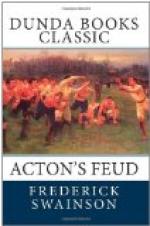On each occasion that Phil got home, Acton answered with a vicious spurt which did not do much good, but only tired him, and at the end of the seventh round I was astonished to think that Phil had stood the racket so well. Phil’s lips were puffy, and one eye was visibly swelling, and he had other minor marks of Acton’s attention, but he was in excellent condition still. Acton was damaged above a bit, and Phil’s first-round reminder showed plainly on his cheek.
Acton began to think that unless he could make Phil dance to a quicker tune pretty soon, he himself would be limping round the corner of defeat, for he was very tired. When we called them up for the eighth round, he had evidently determined to force the fighting. Much as I disliked Acton, I could not but admire his splendid skill; he bottled up Phil time and again, feinted, ducked, rallied, swung out in the nick of time, planted hard telling blows, and was withal as hard to corner as a sunbeam. As I sponged Phil at the end of the eighth I felt that three more rounds as per last sample would shake even him, so I said, “Try, old man, for one straight drive if he gives you a ghost of a chance. Don’t try tapping.”
Acton came up smiling; in a twinkling he had Phil at sea by his trickiness, and was scoring furiously. Then, for the first time, Phil backed, shortly and sharply. Acton sprang forward for victory, and a huge lunge should have given Phil his quietus, but it was dreadfully short, and stung rather than hurt. Phil recovered the next moment, and was on the watch again cool and cautious as ever. Then Acton, following an artless feint which drew Phil as easily as a child, ducked the blow and darted beneath his guard. I gave Phil up for lost. How it happened, though I was watching carefully, I cannot say, but Acton seemed to slither or stumble on the turf as he rushed in, and for one second he was at Phil’s mercy.
At that very instant Phil’s arm flashed out, and with a blow which would have felled an ox, he caught Acton between the eyes. Acton dropped to the ground like a bludgeoned dog.
Phil, like a gentleman, backed a yard or so away, waiting for Acton to get up again, but he made no sign. Vercoe and I then counted him out with all due formality, and Phil had won at the very moment he was about to be beaten. We did our best for Acton, who was unconscious, and, just when we began to despair of bringing him round, he opened his eyes with the usual vacant stare. In a minute he recovered his thoughts, and said eagerly, “Then I’ve won.”
“Not quite,” said Vercoe, grimly. “You’ve jolly well lost.”
Acton tottered to his feet blind with rage—diabolic rage—but hate and fury couldn’t give him strength to stand. Vercoe gently caught him, and laid him quietly on his back, and sponged his face where the awful force of Phil’s blow was becoming plainer every moment.
He compressed his lips with rage and pain, and looked at Phil with such a look of deadly hatred that Vercoe was disgusted.




